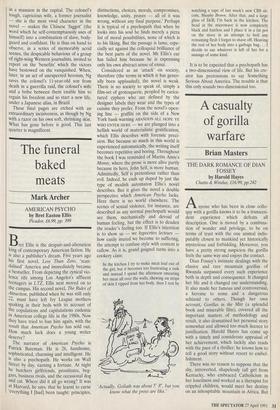The funeral baked meats
Mark Archer
AMERICAN PSYCHO by Bret Easton Ellis Picador, £6.99, pp. 399 Bret Ellis is the despair-and-alienation king of contemporary American fiction. He is also a publisher's dream. Five years ago his first novel, Less Than Zero, 'scan- dalised' America and immediately became a bestseller. From depicting the cynical vio- lence rife among Los Angeles's affluent teenagers in LTZ, Ellis next moved on to the campus. His second novel, The Rules of Attraction, published when he was still only 22, must have left Ivy League mothers quaking in their beds with its account of the copulations and capitulations endemic In American college life in the 1980s. Now they have tried to ban him again, with the result that American Psycho has sold out. How much luck does a young writer deserve?
The narrator of American Psycho is Patrick Bateman. He is 26, handsome, sophisticated, charming and intelligent. He is also a psychopath. He works on Wall Street by day, earning a fortune. At night he butchers girlfriends, prostitutes, beg- gars, business rivals, and the occasional dog and cat. Where did it all go wrong? It was at Harvard, he says, that he learnt to curse everything I [had] been taught: principles, distinctions, choices, morals, compromises, knowledge, unity, prayer — all of it was wrong, without any final purpose.' Perhaps it is typical of a psychopath that when he looks into his soul he finds merely a pizza list of moral possibilities, none of which is to his liking. But the passage is lame, espe- cially set against the colloquial brilliance of the best parts of the novel. Mr Ellis's ear has failed him because he is expressing only his own abstract sense of ennui.
Considered as an 'attack' on society, therefore (the terms in which it has gener- ally been applauded), the novel is weak. There is no society to speak of, simply a film-set of grotesquerie, peopled by carica- tured cyphers who are defined by the designer labels they wear and the types of cuisine they prefer. From the novel's open- ing line — graffiti on the side of a New York bank warning ABANDON ALL HOPE YE WHO ENTER HERE — we are plunged into a hellish world of materialistic gratification, which Ellis describes with forensic preci- sion. But because so much in this world is experienced automatically, the writing itself becomes repetitive and boring. Throughout the book I was reminded of Martin Amis's Money, where the prose is more alive partly because its hero, John Self, is more human. Admittedly, Self is pretentious rather than evil. Indeed, he ends up duped by just the type of modish automaton Ellis's novel describes. But it gives the novel a double perspective which American Psycho lacks. Here there is no world elsewhere. The scenes of sexual violence, for instance, are described as any normal psychopath would see them, mechanically and devoid of human feeling, but the effect is to deaden the reader's feeling too. If Ellis's intention is to show us — we hypocrites lecteurs how easily inured we become to suffering, the attempt to confuse style with content is callow. As it is, grand guignol turns into a cookery class:
In the kitchen I try to make meat loaf out of the girl, but it becomes too frustrating a task and instead I spend the afternoon smearing her meat all over the walls, chewing on strips of skin I ripped from her body, then I rest by
`Actually, Goliath was about 5' 8", but you know what the press are like.' watching a tape of last week's new CBS sit- com, Murphy Brown. After that, and a large glass of J&B, I'm back in the kitchen. The head in the microwave is now completely black and hairless and I place it in a tin pot on the stove in an attempt to boil any remaining flesh I forgot to shave off. Heaving the rest of her body into a garbage bag... I decide to use whatever is left of her for a sausage of some kind.
It is to be expected that a psychopath has a two-dimensional view of life. But his cre- ator has pretensions to say Something Serious About America. The trouble is that this only sounds two-dimensional too.


















































 Previous page
Previous page